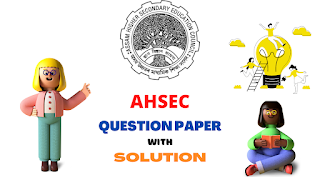AHSEC| CLASS 11| POLITICAL SCIENCE| SOLVED PAPER - 2017| H.S.1ST YEAR
2017
POLITICAL SCIENCE
Full Marks – 100
Time: 3 hours
The figures in the margin indicate full marks for the questions
PART – A
(Indian Constitution at Work)
1. Answer the following as directed: 1x6=6
a)
Who
was the President of the Constituent Assembly of India?
Ans:- Dr. Rajendra Prasad was the President of the Constituent Assembly of India.
b)
India
as a secular State. [Write True or
False]
c)
Which
Fundamental Rights enshrined in the Constitution of India is regarded as the
‘Heart and Soul’ of the Constitution?
Ans:- Right to constitutional remedies.
d)
Write
a difference between General Rights and Fundamental Rights.
Ans: - If the legal right of a person is violated, then it goes to a general court, but if any fundamental right is violated, the constitution provides that the affected person should go to the High Court or the Supreme Court.
e)
Which
Article of the Constitution of India has given special status to Jammu and
Kashmir?
Ans:- Article 307 of the Constitution of India has given special status to Jammu and Kashmir.
f)
Mention
one Ideal enshrined in the Preamble to the Constitution of India.
Ans: - Freedom of thought, expression, belief and worship.
2. Write two functions of the Constitution.
2
Ans:- Two functions of the constitution: -
(a) It forms a national government consisting of a legislative, and executive and judicial branch with a system of checks and balances between the three branches.
(b) It distributes power between the federal government and the states.
3. Mention two rights enshrined in the
Article 19 of the Constitution of India. 2
Ans:- Article 19 of the constitution guarantees six fundamental freedoms of citizens:
(i) Freedom of speech and expression
(ii) Freedom of assembly
4. What is Universal Adult
Franchise? 2
Ans:- The Universal Adult franchise means that the right to vote should be given to all citizens, irrespective of any race, class, color, religion or gender. It is based on equality, which is a fundamental principle of democracy.
5. Mention two features of
Civil Services in India. 2
Ans: - Two features of civil service in India:
(a) They form the
permanent bureaucracy of the Government of India.
(b) Civil service
is responsible for implementing the policies made by the ministers elected by
the government.
6. What is State Finance
Commission? 2
Ans:- The State Finance Commission is a constitutional body of experts in public finance and public administration at regular intervals of five years under Article 2431 of the Constitution to review and revise the financial condition of Panchayat Raj Institutions and Urban Local People.
7. Write two characteristics of local government. 2
Ans:- Two
features of local self-government.
(i) Local
government has a defined area allocated by the state government. Local
government provides active participation of local people.
(ii) Local
government provides civic amenities to the people for their good.
8. Mention three federal
and one non-federal features of Indian Federation. 3+1=4
Ans:- Three federal and one non-federal
features of Indian Federation are given below:
Federal features:
(i) Fundamental Rights: - Under its Part III, the Constitution of India guarantees six
fundamental rights to its citizens.
(ii) Fundamental Duties: - Under Article 4A of the Constitution, Article 51A enumerates 10
fundamental duties for a citizen of India.
(iii) Division of powers: Like every other federal constitution, the Constitution of India
divides powers between the central government and the state governments.
Non-federal features:
(i) Very Strong Center: The unitary character of the Indian Constitution is fully demonstrated by its provisions that establish a very strong central government.
9. Mention four functions
of the Election Commission of India. 4
Ans:- Functions of Election Commission of
India:
(i) Voter list
preparation: The Election Commission prepared a
voter list for the election of Parliament for the assemblies of all the states
including local bodies.
(ii) Superintendent and
Director: Directing and controlling all matters
relating to election to Superintendent, Speaker and Deputy Speaker, Parliament
and State Legislatures.
(iii) Advice: To advise the President and Governors on the questions of
disqualification made by the members of Union or State Legislatures.
(iv) Appointment of
Election Officers: Appointment of Election Officers
to investigate disputes related to or connected with the election system.
10. Explain four functions
of the Parliament of India. 4
Ans - Four functions of the Parliament of India:
(i) Legislative
Business: The Parliament makes laws on all subjects listed in the Union List.
It can also legislate on subjects listed under the concurrent list.
(ii) Financial
Control: The Central Parliament has special means to raise revenue for public
services.
(iii)
Constitutional work: The Parliament has the power to amend the Constitution.
Constitutional amendments are to be passed by each House with a two-thirds
majority with total membership.
(iv) Electoral work: The elected members of Rajya Sabha and Lok Sabha are elected for the election of Vice President.
(Buy E-Books to read complete solutions)
DOWNLOAD [PAGE LINK:-CLICK HERE]
***
POLITICAL SCIENCE SOLVED PAPERS PAGE LINK - Click here
BUY E-BOOK (PDF FILE)
[TO SEE FULL SOLUTION]
(Chapter wise Notes, Exam Question Papers solved, MCQ solved) [ARTS, COMMERCE, SCIENCE]
|
DOWNLOAD PAGE LINK:-CLICK HERE |
AHSEC PAGE LINK - CLICK HERE
Also Read:

